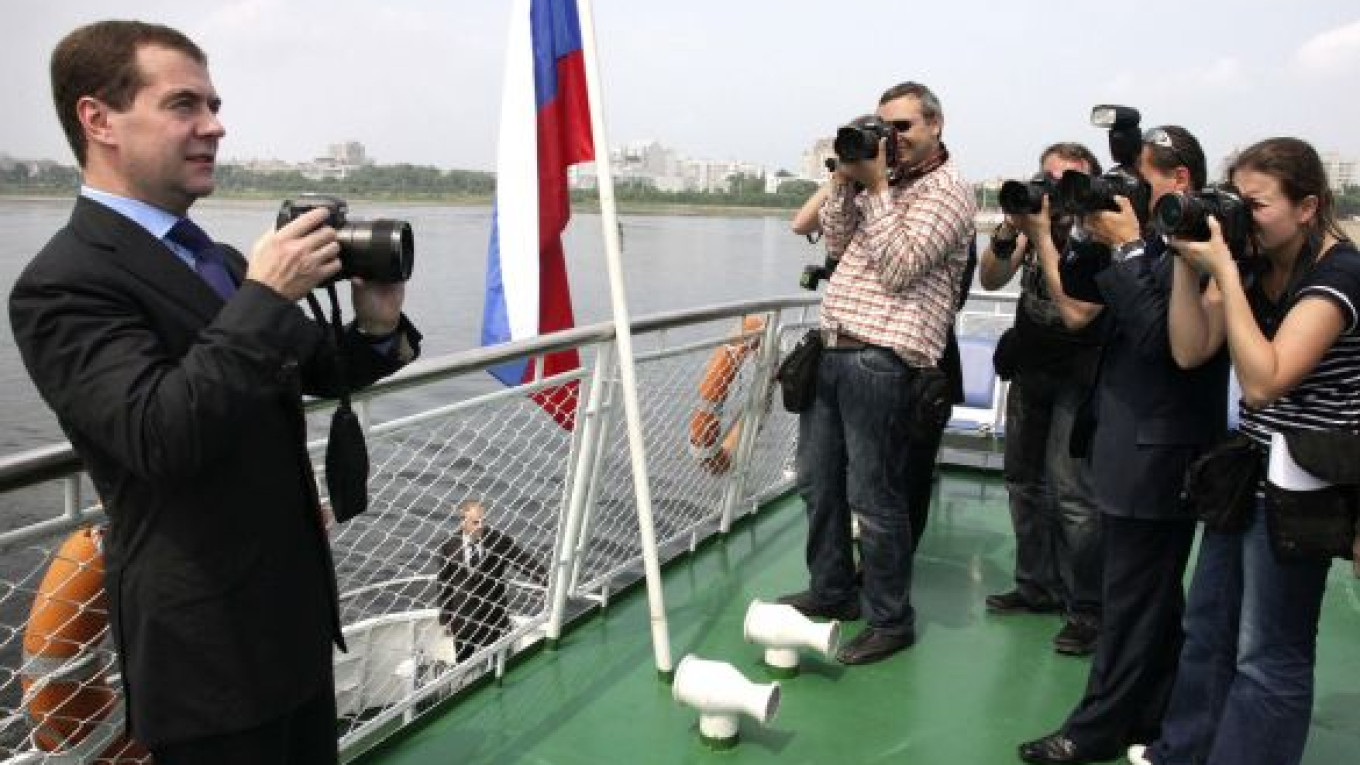ABOARD THE AMUR — President Dmitry Medvedev expressed his frustration on Saturday about a shrinking population in Siberia and the Far East and voiced support for stricter border controls to stave off foreign immigration.
The falling population is a problem for many local officials, who watch with alarm the growing number of immigrants from heavily populated China who are filling the vacuum left by Russians as they leave the region.
Overall, Russia recently registered its first population increase since the chaotic years after the Soviet Union fell. But the population of more than 24 million who now live east of the Urals is still shrinking by half a million people a year.
"This is really bad. As this very region needs more workers, we witness a shrinking population here," Medvedev said aboard the Amur ship as it sailed on the Siberian river of the same name near the Chinese border.
The birthrate in the vast territory of Siberia and the Far East is low, and many people are migrating to European Russia, where living standards are higher.
"This is a huge region that is sparsely populated," Medvedev said, citing a demographic report on Siberia and the Far East, at a meeting with Konstantin Romodanovsky, head of the Federal Migration Service.
"No one from Central Russia and other countries will go there for a piece of land and a cow. No one is interested in it without TV and Internet," he said.
Many Russians fear that China might be lured into the vast territories beyond the Ural mountains, which demographers speculate may be home to as few as 4.5 million people by 2015, to satisfy its craving for raw materials.
According to the report, more than 20,000 "Russian natives" have returned to the country, but only slightly more than 3,000 of them had chosen to live in Siberia and the Far East.
Medvedev also said security should be improved to make the crossing of the border "more orderly."
"We need to create a modern border, modern checkpoints, and at the same time to solve the social issues of the border [officials]," he said, without mentioning China.
Between 1992 and 2006, Russia lost 400,000 to 650,000 people per year because of emigration, falling life expectancy and growing infant mortality. In the 1990s, life expectancy for men dropped to 55 years, 20 years below that of Western Europe.
War games are in full swing in Siberia and the Far East, the Defense Ministry said Friday, and some analysts see them as a signal that the Kremlin is keeping a firm grip on the region.
"Russia is conducting these operations to reassure itself that it can still control these sparsely populated regions," military analyst Alexander Golts said.
Defense Ministry officials said the drills involved up to 5,000 troops, 200 vehicles and 20 helicopters rehearsing special operations and using live-round ammunition on Friday, to "detect, block and destroy illegal armed formations." The war games are under way in provinces that border Mongolia and China.
Emphasizing their importance, Medvedev is expected to oversee the naval phase of the exercises, which for the first time in Russia's modern history will involve warships of three fleets, including the heavy nuclear-powered cruiser Peter the Great from the North Fleet.
The maneuvers belong to the wider Vostok 2010 exercise that runs from June 28 to July 8 and involves as many as 20,000 troops, 2,500 armored vehicles, 70 warplanes and 30 warships.
A Message from The Moscow Times:
Dear readers,
We are facing unprecedented challenges. Russia's Prosecutor General's Office has designated The Moscow Times as an "undesirable" organization, criminalizing our work and putting our staff at risk of prosecution. This follows our earlier unjust labeling as a "foreign agent."
These actions are direct attempts to silence independent journalism in Russia. The authorities claim our work "discredits the decisions of the Russian leadership." We see things differently: we strive to provide accurate, unbiased reporting on Russia.
We, the journalists of The Moscow Times, refuse to be silenced. But to continue our work, we need your help.
Your support, no matter how small, makes a world of difference. If you can, please support us monthly starting from just $2. It's quick to set up, and every contribution makes a significant impact.
By supporting The Moscow Times, you're defending open, independent journalism in the face of repression. Thank you for standing with us.
Remind me later.


